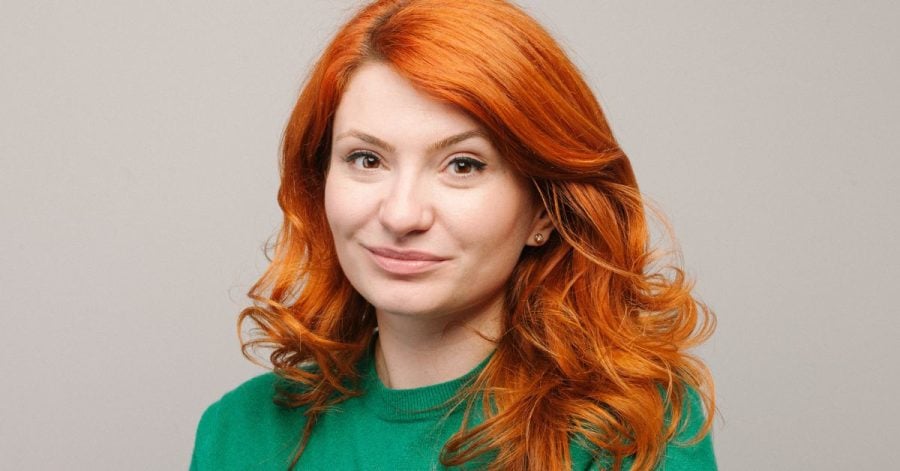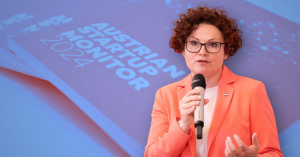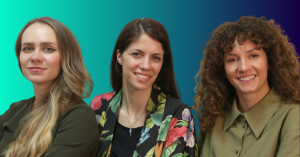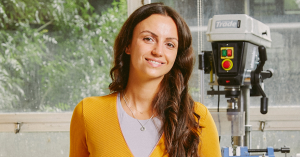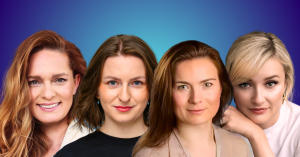As a professional in tech, you are growing at the speed you are building a project. Sometimes you are racing. The world gets blurry around you. The goal you are running towards is the impact of a product on people’s lives. And that is a big responsibility.
As a Google Product Manager, Raluca Pantiru is working on building a common API for storing and sharing health and fitness data on Android phones (# women in tech). A solution that might end up being used by billions of people. No pressure.
Curious to find out more about her journey from working for a Romanian tech startup that got acquired (Vector Watch by Fitbit), to her current role based in the U.K., I found Raluca back in Bucharest, preparing for the big launch at Google Android Health.
She tells me her journey backtracks to Bacau, a Romanian city at the foot of the Carpathian mountains, with almost 200K citizens, a little over three decades ago. The move to the capital was to study law, continued with a master’s in Amsterdam, and is now living between Bucharest and London, in search of a work-life balance.
“Being born in a smaller city automatically makes you become an immigrant in other cities to explore,” she confesses.

The Recursive: You mentioned that your parents are doctors. Do you think this shaped your career in a way since you are working in the wellness-health sphere?
Raluca Pantiru, Google Product Manager: I think it influenced me in the sense that I can be a workaholic. That is how doctors are, and a kid takes after their parents. In the beginning, I was working in a different field, at a law office. And I was reading a lot about tech and how it can influence people’s life positively, particularly in the health and wellness field.
My parents never indicated that I should go to a specific university, which is something that I appreciate and respect. At some point, I was kind of envious of kids that had their parents point them out in a variety of directions. But, you know, I probably wouldn’t have landed where I am right now if that were the case.
You began your tech career working at Vector Watch, which got acquired by Fitbit and then Fitbit by Google. What can you tell us about this journey?
Yes, my LinkedIn profile should say “I keep being bought” – if you want your startup to be bought, or if you are a public company that wants to be bought, you should hire me. 😃
We went from an office of 40 people to a company that had 2000+ full-time employees and contractors, and I am currently working in a huge company. All of this happened more or less within six years. I got to experience companies at different stages at a speedy pace. And I’m still learning about Google in a way after so many months of working for them.
I became aware of a variety of processes, of how some things move at high speed for some and slower for others. When you have a startup, you want to be fast, and get your product to the customers, so you are less concerned about all legal implications or even impact because your initial user base is quite small. You have the option to experiment quickly, get user feedback, and sometimes fail fast.
Whereas in a bigger company, you have a lot of teams working on great innovative ideas, but everything happens at a slower pace. We are very cautious about legal and data. We want to make sure that we ship the right solution for customers because we impact so many users within just a day, or with a very small change. The possibility of having an incredible impact also taught me a lot about responsibility.
What I like most is the fact that I was exposed to all of this, to a variety of people, and managers who shaped my mind and way of working. I love the positive impact the products can have on users and the exposure that comes with the role.
What can you tell me about your days now, as a Google Product Manager?
As a product manager, no matter the size of the company, you don’t get slack time. Whenever you try to have days when you want to take it slower, lots of people can be impacted because they are waiting for answers. You win some, and you lose some, but never a dull moment in my work life.
Do you have more balance in your life compared to when you were working for a startup?
Balance depends a lot on the project and the passion. It’s about the moment in life, and what priorities you have. You can be working quite a lot in a corporation, but then something happens in your life – maybe you start a family or you get a dog, and then you slow down. Or maybe you get health news from your doctor that makes you reconsider your priorities, as it happened to me last year.
I’d like to point out that there are several things we need to do for our job, and we all have the tendency to do more, but then sometimes we want to stop putting in that extra effort. This doesn’t necessarily mean we are not performing at work. It just means that we are doing our job. And no, that’s not “quiet quitting” in any way. The reputation you create is important, especially when you do things that are not part of your responsibilities, the extra things.
I sometimes tend to work late at night, but this doesn’t mean that I expect people to reply at the same time. But this comes with experience because, in the beginning, I was a bit frustrated when I was putting 200% into something, and saw that other people were not doing the same.
In time, I realized the way things develop and that one must adapt to working with everyone to achieve something great. I understood that they were doing their job, as per their career profile. It’s just that I was doing more, and wanted to achieve a lot of things fast forward.
I was so eager to learn as I had just changed careers. I felt like I had to make up for a couple of years that I wasn’t in tech. I also didn’t have a technical background, and therefore I was going the extra mile to catch up with things. I was lucky enough to have had great colleagues and mentors that helped me through my journey.
How diverse is your team at Google now?
For many years, I have had only male mentors. So, there are still cases when I am the only woman at the table. But I think this also depends on the nature of the role. There might be fewer of us in the Product Manager field.
When I joined Google, I learned more about how to identify a few things about boundaries and how you can set certain limits early in the game. For example, maybe some people are not comfortable getting compliments. So sometimes it’s best not to do it.
I think that it would be kind of cool to see this happening in early-stage companies as well, to create awareness around behaviors and unconscious biases.
But why are there fewer Product Managers women?
I think that is something that women are less inclined to do, and it all might come from education. I read an interesting article in The New York Times about how girls excel in school, and boys outperform later in life.
The expectations for girls to learn are higher, so they grow into women that take their time to think things through and come back with a plan. Whereas men are more predisposed to say “Yeah, I’ll do it!”, even though they don’t know the answer to it. But, I don’t know if acting like a man is the solution.
I took a leap of faith. I said I will work for a startup, and I had no idea what I was getting myself into. But I thought, what’s the worst outcome of it? Will I ever get this opportunity again in my life? Probably not. I decided to follow Sheryl Sandberg’s piece of advice: “If you’re offered a seat on a rocket ship, don’t ask what seat! Just get on.” And I don’t know how many women would have done that at that stage in their lives.
What does success mean to you taking into account both professional and personal sides of life; and what are your goals to build this equilibrium that you said you are striving to reach in the following year?
That’s a very complicated question. Success can be very subjective and dependent on where you are in life. I was focused on my career for a couple of years. I have learned so much and accomplished a lot.
Now, I am going to therapy and working on my relationships. I’m trying to listen more, so I’m finding things as I go, but I would say success is being at peace with yourself. Being self-confident. Being less stressed. Living in the moment and not regretting anything.
Working from London is kind of nice because I get to finish my job at 6 pm quite often. This has helped my personal life and well-being a lot. I also want to take swimming lessons and socialize more, build myself a group of friends, and a professional network.
How do you work in London with the rest of the team?
I prefer to go to the office to meet people and build a relationship with them, as physical contact helps with most cultural differences. It also helps a lot to get things to happen faster or to ensure alignment is achieved sooner rather than later.
We also have a gym at the office, and it’s a good motivator. Google is a bit of a spoiling place. However, if people are motivated, they are more likely to work a bit extra to solve an issue.
What are you currently building at Google Android?
We are working on building a common Health and Fitness platform with a thriving ecosystem of developers and users. Android Health Connect is a common API for storing and sharing health and fitness data on Android phones. It comes with a standardized data scheme, granular user permission controls, and centralized privacy and data management controls. We launched the platform for developers at Google I/O in May, and a consumer launch is happening in the coming weeks.
How do you feel at the end of the day that a million people are using what you are building? Did you envision this while growing up in Bacau?
It’s kind of cool, you know, “no pressure”. But it actually might end up being used by hundreds of millions of people, or even billions. That’s pretty exciting!
It’s funny when I was a child, I wanted to be an OBGYN, because a guy who was living on my grandma’s street had a cool car, and that’s what he did for a living. Then, I wanted to be a traffic police officer – that seemed pretty great until I realized all the implications of it; next a PR person. I ended up studying law, and now I work in tech. No, I did not envision this.
It’s been a road paved with both achievements and failures. But I am proud, and amazed when I put everything on paper. And I hope to inspire others too.

